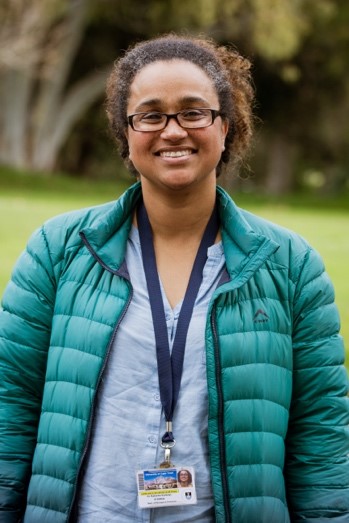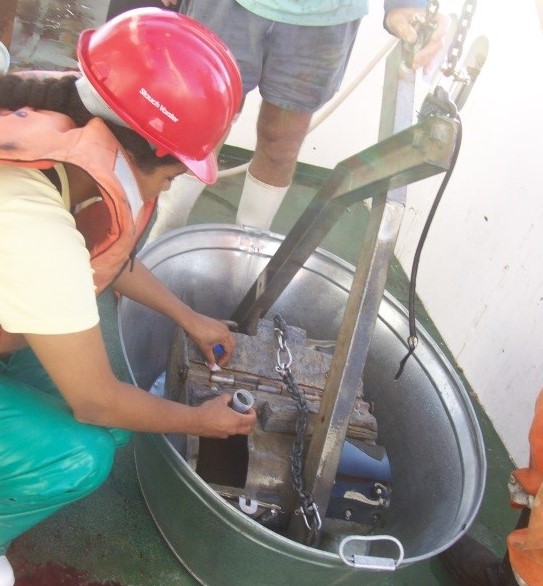By Natasha Karenyi, who is taking part in Soapbox Science Cape Town on 28th September 2019

I’m originally from Paarl and growing up in the Boland, as a young girl, my visits to the ocean were limited to once or twice a year with my family. I remember fishing with handlines off a pier with my grandfather, splashing in the waves with my brothers and desperately trying to avoid the hermit crabs nipping at my toes – there were all sorts of creepy crawlies in the ocean. So, when I finally announced that I wanted to be a marine biologist, my family’s reaction was … ”WHAT??!!??!!??!!”
Let’s put this reaction into context. My family had educators, medical professionals including doctors, receptionists, carpenters and mechanics – all useful professions and trades. I had good marks at school, which meant that I could choose to become a medical doctor or a lawyer. Positions with status in my community. I could be a nurse or a teacher. Any of these careers were possible and if I had pursued them, I would probably have made it work, but my mind was set on marine biology.
I first realized that I loved biology in high school, where we learnt about some of the BIG and small creepy crawlies that live in the ocean. The same creepy crawlies that had frightened me as a child were now fascinating. I also loved swimming having been a swimmer for about 12 years by then – I had never really swum in the sea much though.
When I was 16, I had to do a research project on my future career of interest for Guidance (now called Life Orientation I think). I, of course, chose marine biology. I had to find out what a marine biologist does and where they can work, and then interview an actual marine biologist. I did some research at the Career Research Information Centre (CRIC) in Athlone (this was before we had access to the internet – giving away my age LOL). But I didn’t know any marine biologists. So now what… I called the University of Cape Town (UCT) and asked to speak to a marine biologist. They put me through to the most internationally known marine biologist, Prof George Branch, who literally wrote the book on the marine life of South African rocky shores. After THAT conversation my mind was made up.
The barrage of questions from my parents and grandparents started… What is this thing… marine biology? What do they do? Where do they work? What job would you get? Can you make a living doing that? How long do you have to study? And on it went.
I blame my parents for my tenacity. They taught me to always rise to a challenge, to work hard and to be willing to grow and develop. My mind was shaped during a time when it was clear that apartheid was at an end, and there was hope for a new beginning. Hope is one of those things that makes you think beyond the limitations of what’s come before; to imagine a different future.
I love learning about marine ecosystems, figuring out how the different parts interact and influence each other. And I now LOVE working with the small creepy crawlies that I once feared, to understand how our BIG ocean functions. Passion is what drove me forward for many years. I had great support from my husband, parents, family and friends, my lecturers and mentors. And though there were some obstacles along the way, I completed my PhD in 2015. You develop resilience and perseverance on any career path you choose, but these are imperative characteristics for Women in STEM.
During my PhD I decided that I wanted to be a lecturer at a university; it combined my love of sharing knowledge with my love of learning new things. My mentor, Dr Kerry Sink helped me to develop in the areas necessary to reach that goal. Last year I finally reached it when I became a lecturer in marine biology at my alma mater, UCT.
Since then, I have met other young women from conservative cultures who faced similar reactions from their families and communities. They all faced versions of this rhetoric… “Why extend beyond the known? Choose the safe option. Choose the path that has already been carved out.”
I am happy that I chose to follow my path. And I am even happier that I have been able to provide some opportunities for others to come along with me. Creating a path is not easy but having people who support and encourage you along the way makes the journey easier.
A spin-off of this journey that I did not consider at the start, is this… My daughter and sons think that it’s normal for a mom to have a PhD; to train future scientists and do research. My children know that I love being a wife and a mom, and I love my work. For my daughter, the future is filled with a plethora of paths and opportunities and none of them are closed to her. She will make the choices that are right for her. And my children see no difference in the abilities of girls or boys to do science. This makes me very happy.
I’ve created a little path through the unknown, but my association with Soapbox Science is about helping others to realize that they can carve out their own paths as well. Perhaps by creating your own path you will inspire a young person to imagine a different future for themselves.

Natasha working on a ship collecting creepy crawlies (i.e. the snails, worms and “insects” of the sea) with a grab sampler.
